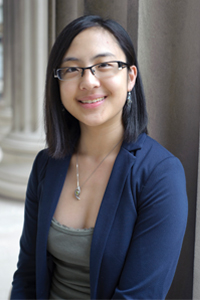As we come to the end of the Energy Studies Minor’s fifth year, the MIT Energy Initiative (MITEI) would like to highlight our 2014 Energy Studies Minor (ESM) seniors. Thirty-four members of the class of 2014 are on track to graduate with the Minor, making this by far the largest cohort to-date. Our students exemplify the strength and diversity of MIT undergraduates. The graduating ESM class includes majors in five Engineering departments, plus SHASS, Sloan, and the School of Science. And, forty percent of our graduating ESM seniors are women. We are so proud of their accomplishments here at MIT, and look forward to continuing to hear of their journeys once they have passed through the doors on June 6th. Congratulations to all of our Energy Studies Minors!

Photo: David Sella
A high school debater, Jacqueline Han anticipated that she would gravitate toward political science at MIT. But she was surprised to find that many energy courses appealed to her as well. After taking Environmental Law, Policy, & Economics (1.801J) and the Physics of Energy (8.21), she was sold on the Energy Studies Minor. She realized she loved puzzling over the “big, interesting questions” that arise when looking at energy through a multidisciplinary lens.
In these classes, “you would hear what is technologically feasible but always be reminded that policy matters,” she says. “That’s where it came together for me.” Han relished the challenge of balancing economic, environmental, and social factors inherent in energy issues.
As she became increasingly interested in environmental policy, Han undertook an undergraduate research project with Christopher Warshaw, assistant professor of political science, collecting survey data on public attitudes toward coal and oil as energy sources. This inspired her senior thesis project exploring how people’s perception of energy issues influences their actions. It is research that has produced some surprises.
Han examined 2010 election returns on an initiative to strike down California’s Global Warming Solutions Act, a bill that set a timeline for reducing the state’s greenhouse gas emissions. Han discovered that in districts affected by wildfires, a majority of voters supported the initiative. She perceives a paradox: “Contrary to what you’d imagine, going through something like a wildfire appears to make you less interested in supporting clean energy.” Han speculates that voters in areas touched by wildfire “who you would assume are more likely to go green” did not accept arguments by clean energy advocates linking climate change, drought, and increased wildfires.”
Han believes these “counterintuitive results” may serve as “a sanity check on environmental strategies,” offering evidence that “scare tactics linking natural disasters to climate change can actually hurt the environmental movement.” She believes that while the science of climate change has advanced, “many people don’t understand the black box of energy.”
Han hopes to be involved in bringing public understanding of these complex issues apace with the science. “I’d like to accomplish a lot in that arena,” she says. She is headed to the Dallas branch of Bain & Company after graduation, where she will pursue energy-related assignments as a consultant. Eventually, she wants to get involved in high-level energy policy, where “we can get humans to adopt clean energy technology faster.”
Jacqueline Han is graduating with a major in Political Science and a minor in Energy Studies. She won second place in engineering in the 2010 International Sustainable World Project Olympiad. Outside of academics, she is interested in competitive foosball and has been on the national tour for the last two years. She will be traveling the country during the summer before starting her consulting job.
Press inquiries: miteimedia@mit.edu